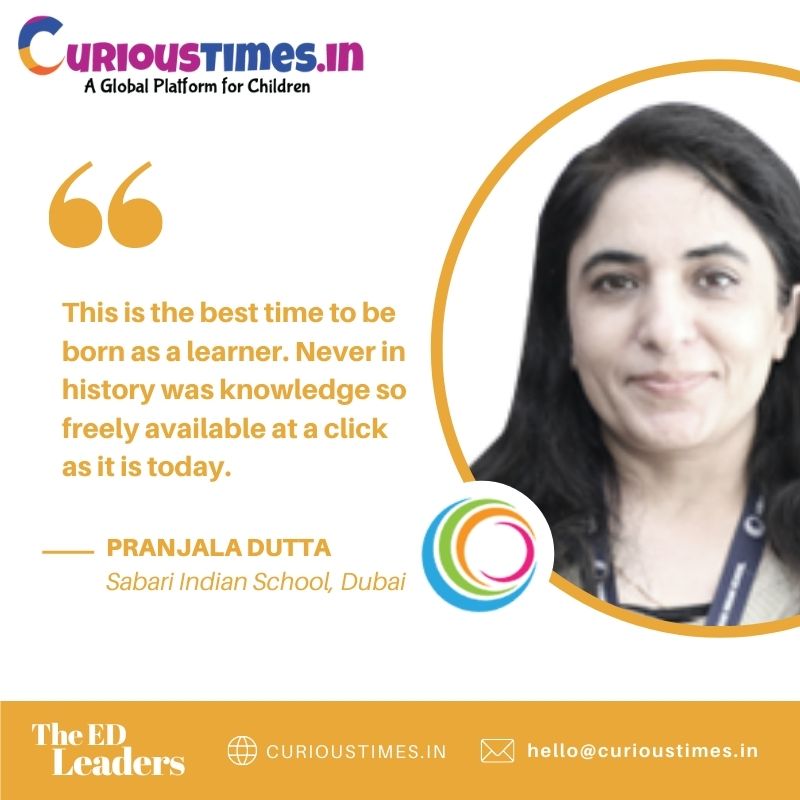
Ed Leader – Pranjala Dutta, Sabari Indian School, Dubai
Ed Leader – Pranjala Dutta, Sabari Indian School, Dubai
Education is an integral part of a child’s upbringing. We, at Curious Times, have made it our aim to ensure that we also play an active role in imparting the right knowledge to all the Curious children. As such, we also are trying to ensure that we are always in touch with the leaders in education today and learning from them. After all, it is important to learn from the best.
So, today, we present to you a one-on-one conversation with Pranjala Dutta. She is the Principal of Sabari Indian School, Dubai. SIS Dubai is a unique school combining the best of the CBSE curriculum with International style teaching and learning to help children achieve their potential.
When did you decide to step into the world of education? What motivated you to become an Educator? Coming from a family of educators, it was the most natural transition for me to step into the life I had seen my parents leading all my life.
Share some of the challenges you have faced in your career journey. How did you convert those challenges into the pillars of success? The first turning point came in my life when I realised that as an educator, my job was more about turning my students into independent thinkers and learners and not merely the reproducers of the knowledge we put into them. As daunting as it was initially, what helped me sail through, was the guidance of my mentors and the courage to accept failures as stepping stones.
Ever since I started the role of a school leader, my major challenge has been to make the teachers unlearn and relearn the pedagogical practices suitable for this century’s learners. It is challenging because most teachers come from the background where they were taught in a traditional ‘sage on the stage’ manner.
The constant support that we provide to the educators starts with the “mistakes being our best teachers” approach. This is followed by individual performance improvement plans that have helped teachers evolve into successful educators of the 21st century.
What are the changes have you observed over the years in the field of education? Are you happy with these changes? As mentioned above, with the ever-increasing role of technology, it has become evidently easier to make learning self-paced, creative and critical thinking based. Knowledge is no longer the prime mantra of education now. It is the application of this knowledge coupled with other elements of analysis, evaluation and creation that have reshaped the whole landscape of learning in the most recent years.
What changes would you like to see in the field of Education? What role can the various stakeholders like the government, teachers, students and parents play in this? As we are on the threshold of a new era in the history of education, I think we need to equip and empower our teachers in such a way that they jump into this profession out of choice and not out of compulsion. They must feel rewarded for the efforts they put in with their learners.
All the stakeholders could make it their collective goal to contribute effectively as parents, governors and community members. They could co-plan learning opportunities with the school and get more closely involved as partners.
A school must be seen as everybody’s school, not just the students’.
Share your message with the aspiring teachers and leaders of tomorrow. There is a heavy responsibility on our shoulders specifically because of the speed at which education is changing; we need to keep pace with it by incorporating new pedagogical practices, discarding redundant parts and collaborating with educators locally and globally. Unlike our predecessors, we are preparing our students for professions that do not even exist today. Therefore, the best we could do is equip them with such skills that will be equally useful, irrespective of their future job profiles. Creativity, Critical Thinking Collaboration and Communication are broadly considered to be the universal skills that were unfortunately not given much emphasis during our years as students. Hence there is a need to first acquire these skills and then practise them with our students.
Share your message for your and Curious Times students. This is the best time to be born as a learner. Never in history was knowledge so freely available at a click as it is today. So, all that you need to do now is identify your true potential (for which, plenty of assessments are available online). Then use your potential to explore all that you find interesting and build lifelong skills that will not only help you become successful in your work but in life too. This luxury was not available to your parents or teachers, so go grab it with your head, hands and heart. Caution: beware of distractions.
Pranjala Dutta, Principal
Sabari Indian School, Dubai

Curious Times is committed to providing the best experience and news to children. We bring to you the Curious Times Weekly with the top news of the week. You can also check out The Curious Magazine, the first children’s magazine with all the great content by the children, for the children. We would love for you, dear children, to write and get your stories, art, thoughts and more published at My Expressions. Write to us at hello@curioustimes.in.You can also follow us on WhatsApp, Instagram, Facebook Youtube, Twitter, LinkedIn.
0 (Please login to give a Curious Clap to your friend.)
SignUp to Participate Now! Win Certifiates and Prizes.

Login/Signup